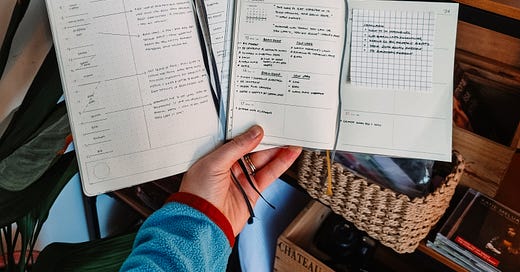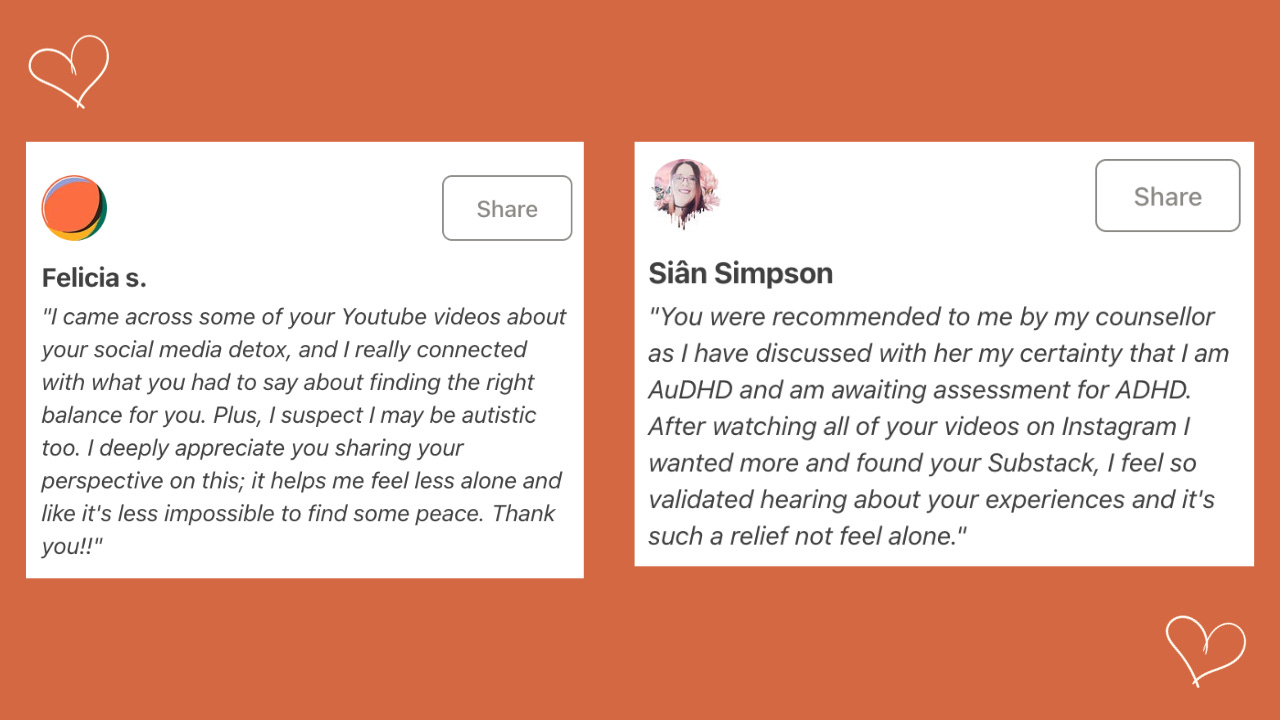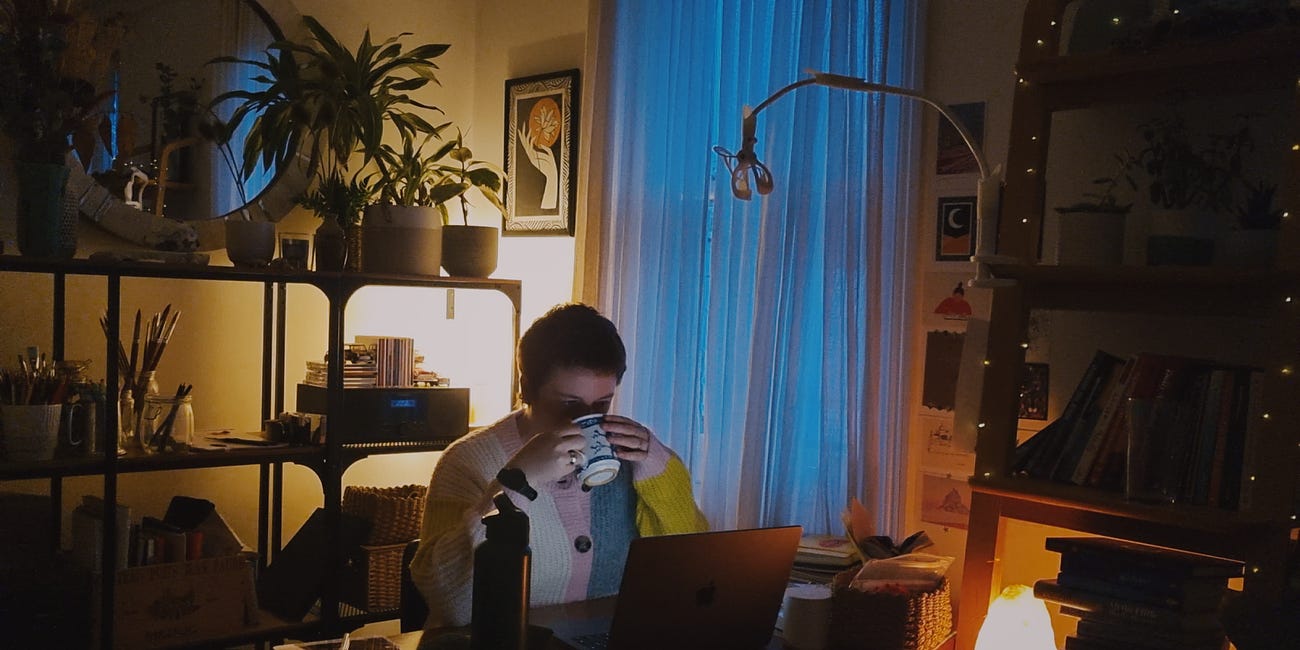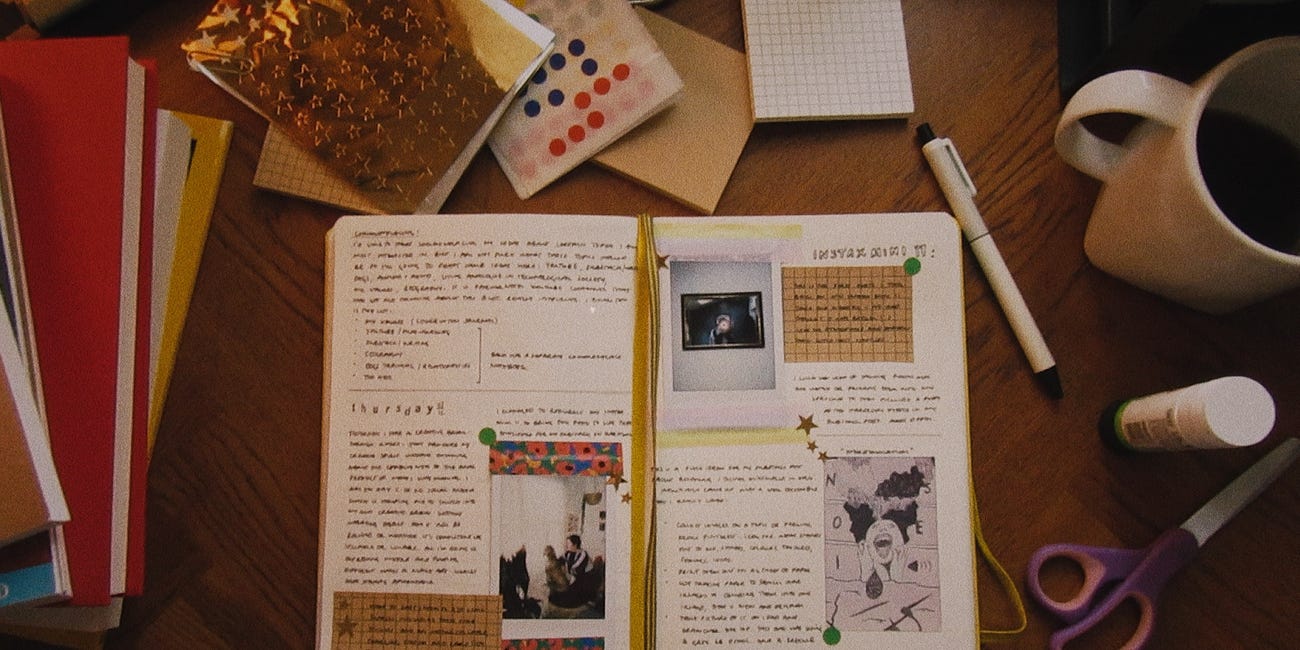Stop copying everyone else (they're not you)
"I was trying very hard, but I was unknowingly adopting neurotypical tools and holding myself to neurotypical standards - tools and standards I could never reach."
Dear fellow human,
For me, time does not feel linear. Instead it is a chaotic spiral that shape-shifts unpredictably. I believe I have a grasp of it one minute, and the next watch it slipping out of my hands like sand.
When it comes to time-keeping, the defining feeling I have is one of helplessness. However hard I try to stretch the spiral of time into one long, predictable line it feels like an impossibility. I try to be on time, but turn up obnoxiously early or unacceptably late. I try to recall my schedule, but end up stumbling over my response to anyone who asks about my plans. I try to plan ahead, but find myself meeting deadlines at the last minute (or not at all).
How can it be so hard? Why do some people seem to float over this chaos I am drowning in? What’s the secret step I am missing?
In my 20s, faced with a career as a lawyer that required significant time-management skills, I obsessively studied productivity hacks, tried out various apps, and copied other people’s systems. But I always found myself back in the slippery spiral struggling to keep up.
There were some make-shift tools that stuck like scheduling birthdays with multiple reminders in advance and relying on weekly or monthly reminders to text and call various friends and family members (because, yes, the chaotic spiral followed me into my personal life too). But they were rarely fool-proof. At least for this fool.
Though I don’t like to refer to myself as a fool anymore. I’m not a fool. I am ‘just’ autistic and have ADHD. Knowing this now helps me to let go of the self-criticism a bit. Though internalised ableism frequently likes to remind me that I ‘should’ be able to do better if I ‘just try harder’. I try, okay? There is no lack of trying here.
I discovered that, whilst trying is part of the equation, a much larger part is knowing how to try. And knowing how to try is predicated on knowing myself and how my brain works - something I didn’t know for 30 years!
I was trying very hard, but I was unknowingly adopting neurotypical tools and holding myself to neurotypical standards - tools and standards I could never reach. Knowing what I know now, I give myself permission to ignore what everyone else is doing and tap into how my unique brain sees things. Among other changes, this led me to delete the apps - instead, I write everything down the ‘old school’ way.
It’s interesting to me because I bought into the idea that we are sold that more technology necessarily makes us more efficient and in turn helps us in life. But, for me, this is not always the case. Unless I physically write with pen and paper, a deadline or an idea or an appointment may as well not exist. I can’t ‘see’ an app, it isn’t something physical that I can touch, and typing with my thumbs doesn’t connect me to the information I am storing. Even the act of entering information digitally is often left half-finished when I get distracted by a notification.
Notebooks, on the other hand, are physical. They exist as inanimate objects in my environment that I can pick up and put down. The physical act of putting pen to paper connects me to this reality. It’s hard to put into words but it feels as if the act of writing slows the spiral of chaos down for long enough for me to ground, focus, and connect. As French author Jules Renard said:
“Writing is a way of talking without being interrupted.”
In many ways, by modern metrics, my notebooks (which equate to a large stack by this stage) aren’t very convenient. They’re heavier than my phone, more easily destructible, and take longer to ‘sync’. But the metric that matters to me is not convenience. Convenience is pointless to me if it doesn’t actually help me reach my goal: in this case, to ground myself in the chaotic spiral that is my life.
The paper planning system I created, which is still evolving, is unique to my needs. I don’t think it is a coincidence that by sitting down with a blank piece of paper and asking how I need to be supported in my life for the first time, I have been able to poke my head above the precipice of chaos to actively and intentionally manage the spiral. I don’t think my experience of time will ever feel linear, but it is easier to manage the spiral when I’m tuning into addressing my needs rather than copying others’ systems.
Sure, it’s not perfect. No one or thing is. I still miss appointments, forget to update my calendar, and beat myself up for losing track of time. On some days I don’t have the energy to do anything at all, let alone plan my day. But that’s okay, because a fundamental part of my notebook system is accommodating for slip-ups and changes in my plans - I have decided to be okay with crossing things out and shuffling things around so when I inevitably get caught up in the spiral I don’t attach any moral judgment to it. It just is.
In this way I like to think of my physical planner as a way of processing time. It is the act of writing that helps me get to know myself and my needs, experiment with different systems, and discover my point of view amidst its chaotic spiral.
“As I write, there rises somewhere in my head that queer and very pleasant sense of something which I want to write; my own point of view...”
― Virginia Woolf
Invitations for personal reflection:
What does the experience of time feel like for you?
Do you have a system for planning your day-to-day and is it serving you?
If you were to ignore all conventional advice, what do you need from your planning system?
How can you invite more grace and self-compassion into how you manage your day-to-day?
Sending love,
Charlie
P.s. Thank you and welcome to recent paid subscribers, including Felicia and Sian who generously shared the below about why they decided to join the paid membership. I am feeling buoyed by your support (in so many ways) to keep writing and creating. Thank you.
If you enjoyed this letter and wish to support my work you can:
leave a heart and comment on this post on Substack
share this letter with a friend, or restack it on Substack
become a free or paid subscriber
You might also like:
Trusting what feels right and true
Dear fellow human, For the last few years I have chosen a ‘word of the year’ to guide my intentions into the New Year and beyond. But this year I feel drawn towards a phrase; what feels right and true? My natural disposition is to believe I can think my way through life, but what if I were to trust in how it









Gosh I related so much to what you've written here, Charlie, including the 'inconvenience' of carrying around multiple heavy, cumbersome notebooks when I can see that yes, an app would be better but how do I remember to check it? And yes an alert is helpful unless i'm so deeply into something it hurts to breakaway, so dismiss the alert, claw back my focus, and forget anyway! Gah. And thank you. I'm learning to attach less and less moral judgement to these qualities, in part thanks to people being willing to share their experiences.
I really relate to your words here Charlie. I often ‘joke’ that I have no concept of time but I think the joking is sort of a coping mechanism because it can actually feel a bit scary and worrying (and stressful) to not have a firm grip on time like everyone else seems to. It’s nice to know I’m not alone x